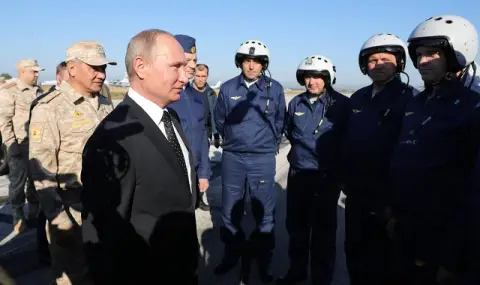Russia's influence in the Middle East has been undermined. Ill-informed, indecisive and too dependent on Iran - this is how Moscow appears to Middle Eastern governments in the light of the situation in Syria, believes Konstantin Eggert.
https://p.dw.com/p/4pZ7A
Vladimir Putin and Bashar Assad at the Hmeimim air base in December 2017Photo: ZUMA Press/imago
ADVERTISEMENT
The new leadership of Syria has said that it will not extend the contract with Russia for the naval base in Tartus. Most likely, the fate of the nearby Hmeimim air base will be the same. Thus, the 54-year history of the permanent Soviet, and later Russian presence is coming to an inglorious end.
Naval experts from various countries are unanimous: the Russian fleet is weaker and in worse condition than the fleets of the United States, France and Great Britain. Russia's Black Sea Fleet was effectively expelled from Crimea to Novorossiysk. However, the Kremlin needs the base - it is a key link in the logistical supply chain for Russian mercenaries in Sudan and the Central African Republic. The Kremlin also uses it to support "its man" in Libya - Marshal Khalifa Haftar.
Erdogan's role
Turkish President Erdogan is the main foreign politician who has influence over the new Syrian leadership. From the point of view of the Syrian Sunnis, who won the civil war, the Russian military, who bombed and shelled them, are hateful murderers for whom there is no place in Syria. But emotions in politics often give way to calculations and external influence.
When the Assad regime fell, it was not ruled out that Ankara, under certain conditions, would still try to persuade the former rebels and current rulers of "Hayat Tahrir al-Sham" to allow Moscow to maintain a limited presence on the Mediterranean coast, at least for a certain time. But it seems that Erdogan did not want to lobby for Vladimir Putin in Damascus. Or he lobbied, but was refused.
According to an informed diplomat from the region, "the Turks, of course, influence the government in Damascus, but they do not command it". In addition, in recent months, visits by Turkish diplomats to Libya have become more frequent - it seems that Haftar is increasingly becoming "their man". "Erdogan likes to have, so to speak, exclusive relations with Turkey's political "clients" in various countries. "In Libyan affairs, Russia is now rather hindering him," the diplomat notes.
The situation is humiliating for Putin. If people from Bashar Assad's inner circle are to be believed, Putin has simply "given up" on the Syrian dictator - he did not answer his calls for a long time, made him wait for days at the Moscow Four Seasons Hotel to be received. For several weeks, the following conspiracy theory was popular in the Middle East - that Putin had given up on saving Assad, hoping to secure an extension of the base contract through Ankara. Now it is clear: the lightning offensive of the rebels and the collapse of the Assad regime were a real surprise for the Russian regime. And aggression against Ukraine seems to be the only thing the Kremlin is still capable of thinking about and still has the resources for.
The upcoming withdrawal of the Russian military from Syria will not go unnoticed in the Middle East, where strength is the basis of respect and stable interstate relations. Literally in a month and a half, the Saudis and Egyptians, Jordanians and Moroccans, Omanis and Israelis have become convinced of how false Putin's claim is that he never abandons his allies in trouble, that the Russian special services are informed about even the smallest detail in the region, that Putin will always find a way to retaliate against those who have offended him...
The Kremlin's miscalculations with Iran
Putin's dependence on Iran as a strategic ally is the other source of his current and future problems in the Middle East. Most countries in the region perceive the Iranian regime at least as a problem, and at most as a potential threat. The expulsion of Iranians from Syria and Lebanon caused undisguised joy among Arab elites. In their memory, the Russian regime is already firmly associated with the cadres of hastily abandoned bases of the Islamic Revolutionary Guard Corps.
Almost simultaneously with the announcement that they would not extend the contract for the base in Tartus, the Syrian authorities also announced a ban on the import of goods from Iran, Russia and Israel. "With regard to Israel, all this is expected. The Islamists in Damascus will not drastically change their traditional position, although in the future anything is possible. But with regard to Iran and Russia, this ban will be for a long time," says the informed diplomat from the region.
When in 2015 Russian troops, together with mercenaries from "Wagner", managed to save the Assad regime, not only the mouthpieces of Kremlin propaganda, but also Western experts spoke of "Russia's triumphant return to the Middle East". Less than ten years later, however, Putin had to leave in disgrace.
